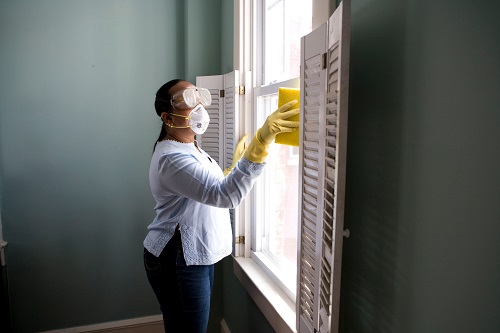Under the weight of the ongoing pandemic, many Canadians took matters into their own hands by launching startup businesses.
Data from mid-2021 suggests one in five (21%) of Canadian entrepreneurs, or 1.9 million people, started their businesses within the past year. Many did so because they had more spare time during the pandemic, were laid off, or felt financial pressures. Furthermore, 72% of Canadians who launched a new business in 2020 say they started one as a side hustle, and most (73%) are optimistic about what the future holds.
Cleaning businesses are proving to be somewhat resilient to the ebb and flow of the economic impacts of the pandemic. It’s potentially one type of small business that can withstand office and workplace closures and a shift to remote work since companies still invest in professional cleaning services to keep their employees safe when they do head to an office. It also encompasses a broad range of services, including floor and carpet cleaning, vacuuming, window washing, upholstery cleaning, and other services in both commercial and residential settings.

Related Posts
Categories
Sign Up for ZenMail
"*" indicates required fields
And in a time when combatting COVID-19 and encouraging employees to return to a workplace has raised awareness about workplace hygiene and ensuring the work environment is safe, the demand for cleaning services hasn’t abated entirely. On the contrary, the global cleaning services market was valued at more than $55 million in 2020 and is projected to grow to more than $111 million by 2030.
5 Steps to Starting a Cleaning Business
Here are five steps to take to get your cleaning business up and running:
1. Create a business plan
Every type of business needs a plan. Your plan is a blueprint that will help you outline and determine your goals, the problems you will solve, how you will make money, target customers, and your competitive advantage. It needs to be a detailed plan with a three- to five-year view outlining how you will achieve your goals and what the path to profitability is. If you intend to apply for a loan or woo investors, a comprehensive business plan is essential to show you are prepared. Your plan should include a description of your cleaning business and details about your products and services, as it will spell out what you will accomplish in the near and long term.
2. Register your business
You need to register your business with the government and declare its type of ownership. You can choose to register as a sole proprietorship, partnership, corporation, or cooperative. Different business structures offer different advantages. For example, a sole proprietorship may be the most inexpensive to set up, and as the owner, you solely control the business. Moreover, filing your taxes is straightforward and doesn’t require a corporate tax return. However, establishing your cleaning business as a sole proprietorship means unlimited personal liability as there is no separation between you and the business. You may start out filing your taxes as a small company, but as your business grows, you might want to consider hiring an accountant to manage that responsibility.
3. Decide on services
Will you provide your cleaning services to residential or commercial customers or both? Once you identify a target market and the area you’ll serve, you can then zero in on the types of services to provide and at what cost. This applies to all kinds of professional cleaning services, including:
- Janitorial cleaning
- Floor cleaning
- Home cleaning
- Air duct cleaning
- Carpet cleaning
- Window cleaning
Research what your competitors provide and what they charge. What differentiates your business from theirs? For example, you could specialize in offering deep sanitation and disinfection services for small businesses.
4. Plan operations
Planning your business’s operations involves several imperatives, such as setting a budget, determining your rates for your services based on your operating expenses, opening a business bank account, and purchasing the cleaning equipment and materials you need. You may be required to obtain a business licence to begin operations in your city or province. Check with your municipal and provincial governments to ensure you get licensed if you need to be. In general, your province may require you to have Workplace Hazardous Materials Information System (WHMIS) training if using certain chemicals and cleaning agents. And, of course, your business’s operations will need cleaning business insurance to protect you from unexpected events or accidents that may lead to a third-party lawsuit.
5. Marketing the business
Think about how you will market and promote your company and services to your offline and online target market. That may include direct mail flyers to homeowners if you’re focused on providing residential cleaning services, for instance. Nevertheless, you’ll need a basic website. Utilizing digital marketing, including email, social media channels, and asking your customers to provide you with a Google Review, all of these efforts can help other potential customers find you online. It’s also worthwhile to set up a free Google My Business page to draw attention to your company and make it easy for people in your region to locate you.
Running a Squeaky-Clean Operation
It’s been said running a cleaning business is one of the easier types of companies to start, run, and manage. But nothing worth having comes without some kind of fight, and that includes your vision of launching a successful small business. For instance, you might want to find a mentor to help guide you as you start and grow your business.
No matter what type of cleaning business you start, understand all the risks your new venture faces and get a customized cleaning business insurance policy to protect yourself and your finances should something go wrong.
Related Posts
10 Tips for Closing Your Small Business for the Winter
Are you closing up shop for the winter? Ensuring your property is prepared for winter and your valuable contents and inventory are safely stored is vital. See our tips for how small business owners can shut down operations and keep their assets safe.
9 Ways to Celebrate Small Business Saturday in Canada
Take advantage of Small Business Saturday to raise brand awareness and attract new customers as the holiday shopping season heats up. See our list of how you can do that cost-effectively.
10 Insurance Tips for Women Entrepreneurs
Navigating the complexities of acquiring the right type of liability insurance can be daunting for any entrepreneur in any industry. See our insurance tips for helping women-owned businesses and startups make informed decisions.








